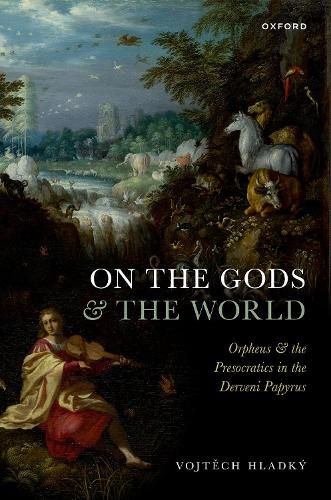Readings Newsletter
Become a Readings Member to make your shopping experience even easier.
Sign in or sign up for free!
You’re not far away from qualifying for FREE standard shipping within Australia
You’ve qualified for FREE standard shipping within Australia
The cart is loading…






The Derveni papyrus is a multi-layered and intricate philosophical and religious treatise written in Greek, probably just before 400 BCE. Since its discovery in 1962, the papyrus has attracted the attention of scholars in several areas of Classical studies, mostly ancient philosophy and religion, but also literary studies. The anonymous author of the text quotes a previously unknown Orphic poem and comments on it using philosophical motifs and concepts borrowed from various Presocratic thinkers but especially Heraclitus and the Anaxagoreans.The book presents a new interpretation of various aspects of this complex text: situating the treatise within the tradition of allegorical interpretation; providing an interpretation of the opening columns, which describe a peculiar ritual and contain some Heraclitean material, including, as the study argues, some previously unknown fragments; reconstructing the contents of the Orphic poem upon which the Derveni author comments; examining various allegorical devices employed by the Derveni author in his explanation of the Orphic poem, following his commentary in detail; and finally, discussing the likely intellectual background in which the Derveni treatise originated.In general, the study argues that rather than being the work of a philosophising Orphic initiate, the Derveni treatise is a philosophical text whose aim was to explain a nonstandard religious poem. The commentary explains the Orphic poem from a perspective influenced by discussions among the followers of philosophy of Anaxagoras and Heraclitus, and employs reflections on the use and function of language found in the writings of some contemporary thinkers. Based on an analysis of sources upon which the Derveni papyrus is based, it is concluded that its author was probably active in Athens in late fifth century BCE and may have been a person close to Socrates' teacher Archelaus.
$9.00 standard shipping within Australia
FREE standard shipping within Australia for orders over $100.00
Express & International shipping calculated at checkout
The Derveni papyrus is a multi-layered and intricate philosophical and religious treatise written in Greek, probably just before 400 BCE. Since its discovery in 1962, the papyrus has attracted the attention of scholars in several areas of Classical studies, mostly ancient philosophy and religion, but also literary studies. The anonymous author of the text quotes a previously unknown Orphic poem and comments on it using philosophical motifs and concepts borrowed from various Presocratic thinkers but especially Heraclitus and the Anaxagoreans.The book presents a new interpretation of various aspects of this complex text: situating the treatise within the tradition of allegorical interpretation; providing an interpretation of the opening columns, which describe a peculiar ritual and contain some Heraclitean material, including, as the study argues, some previously unknown fragments; reconstructing the contents of the Orphic poem upon which the Derveni author comments; examining various allegorical devices employed by the Derveni author in his explanation of the Orphic poem, following his commentary in detail; and finally, discussing the likely intellectual background in which the Derveni treatise originated.In general, the study argues that rather than being the work of a philosophising Orphic initiate, the Derveni treatise is a philosophical text whose aim was to explain a nonstandard religious poem. The commentary explains the Orphic poem from a perspective influenced by discussions among the followers of philosophy of Anaxagoras and Heraclitus, and employs reflections on the use and function of language found in the writings of some contemporary thinkers. Based on an analysis of sources upon which the Derveni papyrus is based, it is concluded that its author was probably active in Athens in late fifth century BCE and may have been a person close to Socrates' teacher Archelaus.